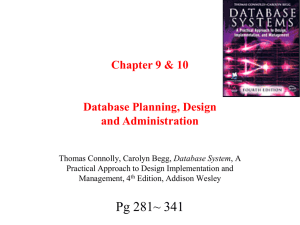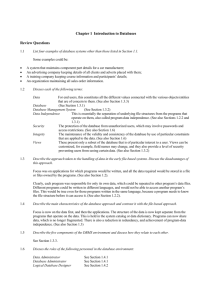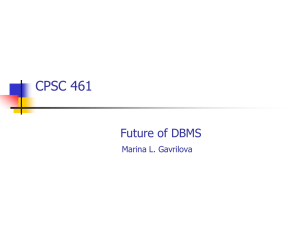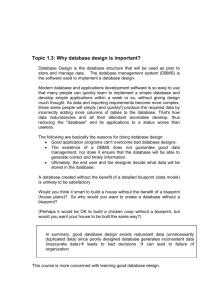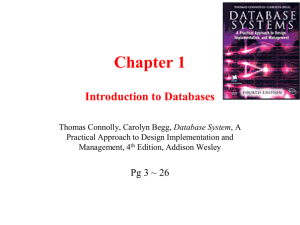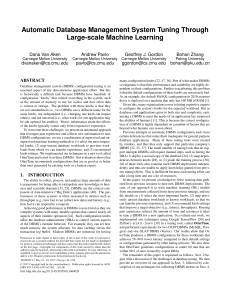Power-Aware DBMS: Potential and Challenges
advertisement
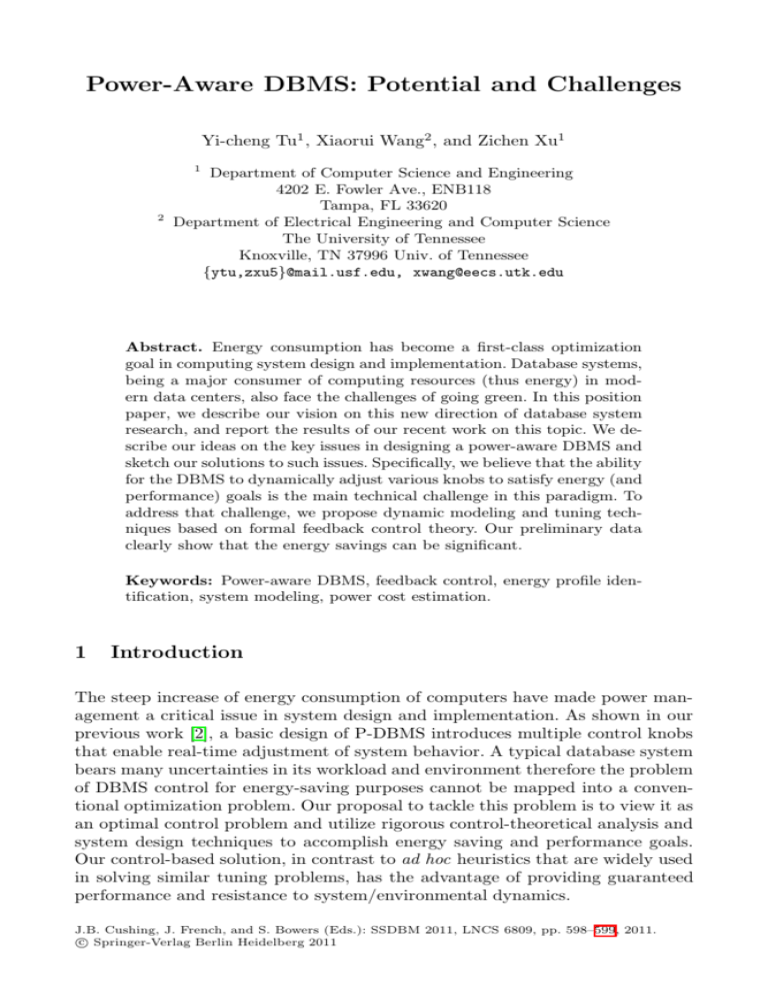
Power-Aware DBMS: Potential and Challenges
Yi-cheng Tu1 , Xiaorui Wang2 , and Zichen Xu1
1
2
Department of Computer Science and Engineering
4202 E. Fowler Ave., ENB118
Tampa, FL 33620
Department of Electrical Engineering and Computer Science
The University of Tennessee
Knoxville, TN 37996 Univ. of Tennessee
{ytu,zxu5}@mail.usf.edu, xwang@eecs.utk.edu
Abstract. Energy consumption has become a first-class optimization
goal in computing system design and implementation. Database systems,
being a major consumer of computing resources (thus energy) in modern data centers, also face the challenges of going green. In this position
paper, we describe our vision on this new direction of database system
research, and report the results of our recent work on this topic. We describe our ideas on the key issues in designing a power-aware DBMS and
sketch our solutions to such issues. Specifically, we believe that the ability
for the DBMS to dynamically adjust various knobs to satisfy energy (and
performance) goals is the main technical challenge in this paradigm. To
address that challenge, we propose dynamic modeling and tuning techniques based on formal feedback control theory. Our preliminary data
clearly show that the energy savings can be significant.
Keywords: Power-aware DBMS, feedback control, energy profile identification, system modeling, power cost estimation.
1
Introduction
The steep increase of energy consumption of computers have made power management a critical issue in system design and implementation. As shown in our
previous work [2], a basic design of P-DBMS introduces multiple control knobs
that enable real-time adjustment of system behavior. A typical database system
bears many uncertainties in its workload and environment therefore the problem
of DBMS control for energy-saving purposes cannot be mapped into a conventional optimization problem. Our proposal to tackle this problem is to view it as
an optimal control problem and utilize rigorous control-theoretical analysis and
system design techniques to accomplish energy saving and performance goals.
Our control-based solution, in contrast to ad hoc heuristics that are widely used
in solving similar tuning problems, has the advantage of providing guaranteed
performance and resistance to system/environmental dynamics.
J.B. Cushing, J. French, and S. Bowers (Eds.): SSDBM 2011, LNCS 6809, pp. 598–599, 2011.
c Springer-Verlag Berlin Heidelberg 2011
Power-Aware DBMS: Potential and Challenges
2
599
Overview of P-DBMS Design
Our vision of building an energy-efficient DBMS is to enhance current DBMS
components with energy-related functionalities, rather than building these components from scratch. This allows us to minimize the impacts on the current
DBMS architecture that is well-designed for performance-driven query processing. The design goal of the system is as follows:
Problem 1. Given a performance bound, the power consumption of the
database system should be minimized.
The above design goal reflects the idea that performance is the most critical
issue, while saving energy cost is a best-effort requirement based on a tolerance
level of performance degradation.
3
Feedback Control for Power Optimization
Traditionally, solutions to adaptive power management problems, as well as those
in self-tuning databases, heavily rely on heuristics. Recently, however, feedback
control theory has been successfully applied to power control in servers and
database tuning [1]. The benefit of having control theory as a theoretical foundation is that we can have (1) standard approaches to choosing the right control
parameters so that exhaustive iterations of tuning and testing are avoided; (2)
theoretically guaranteed control performance such as accuracy, stability, short
settling time, and small overshoot; and (3) quantitative control analysis when
the system is suffering unpredictable workload variations. This rigorous design
methodology is in sharp contrast to heuristic-based adaptive solutions that rely
on extensive empirical evaluation and manual tuning.
Intuitively, the power mode of hardware should be set to a level such that the
system performance converges to the tolerance bound mentioned in Problem 1.
This is because making the performance better than the bound is not necessary
and also implies less energy saving. We are developing a feedback control loop to
satisfy the runtime power and performance requirements set in Problem 1.
4
Conclusions
In this paper, we elaborated on the issues in building such a PDBMS system
and how such issues can be resolved. Our idea was to utilize formal feedback
control theory to achieve effective modeling and system control. We conclude
that power-aware DBMS is a meaningful and interesting approach for tackling
the problem of energy-efficient database systems.
References
1. Lightstone, S., et al.: Control theory: a foundational technique for self managing
databases. In: ICDE Workshops, pp. 395–403 (2007)
2. Xu, Z., Tu, Y., Wang, X.: Exploring power- performance tradeoffs in database
systems. In: Proceedings of ICDE (2010)


